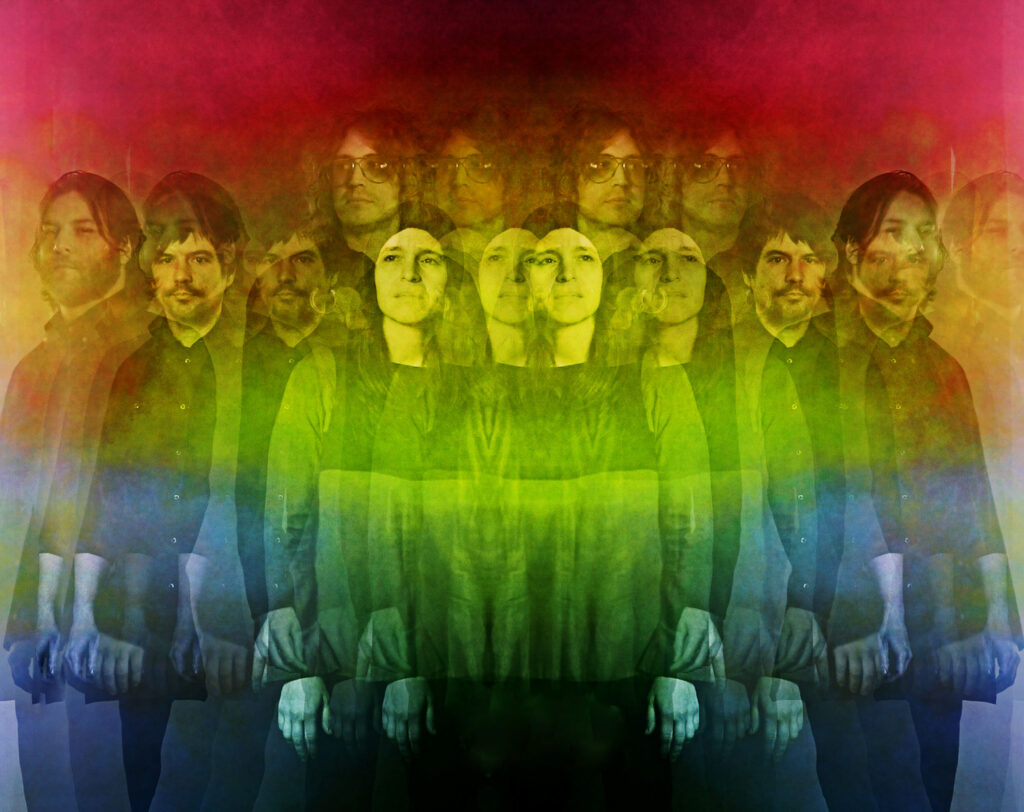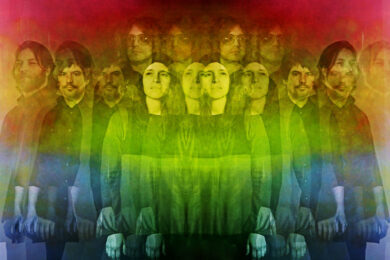We have seen Mars. She is beautiful. She refuses to twinkle, casts her hex with a scarlet blush a provocative 62 million miles distant, while in the midst of our jasmine boscage we observe her moves on the moon through our quivering, bereavement-bequeathed binoculars. She knows and we know our happy band will be among the first to tread her surface, lucky enough to be among the first human beings to live until they’re 400, lucky enough to have cut and sent the right coupon on the right day. Now the chosen ones have been notified, I must pack. Credit card, chuddy, beef-jerky, mankini, smile.
And music of course. Those Candor Chasma nights are long, Petrov has assured me, and he would know. Claude’s dreams have been laughed at, then looked at again in the new light of the prototypes’ failure and the flames it streaked across the launchpad – all is mapped, Palaia is already drilling. In my cylinder podule me and my robot will need sound: to break the ice, sap his batteries for shut-down and rust his out-pipes for research purposes, something to demarcate and dispel the new Martian silence. The two-storey bamboo forests and Regolith-reinforced rec-room will need some kind of soundtrack also, five long Mars years, eight long earth ones until the new arrivals will join us. One eye on the red guy, the other squinting rain into my mouthpiece, I call Lasek in Montreal and ask if I can take Are The Roaring Night, the latest transmission from his crew, The Besnard Lakes, to soothe those earth-sick jitters. Mission protocol 1: be polite. Then just do it anyway. There’s no way we’re coming back. Hello, Captain Jace Lasek? A report on your trajectory please.
“I went backwards” crackles my earpiece. “I went from cassettes back to vinyl. Cassettes because a lot of the music I liked was on cassette. But going back to the vinyl, that was a revelation to me when I was really young – things like Floyd that should be listened to as a whole. Albums are a special secret thing that you get lost in – I remember getting Prince’s Around The World In A Day on vinyl when I was a kid and realising that all the songs were linked to imagery on the sleeves. Listening to it those connections made the music resonate even more, and it felt like I was the only one in the world with access to that secret knowledge. Of course, I wasn’t the only person to figure that all out but when you’re spending a lot of time listening to albums from start to finish it’s easy to believe it. We and our sleeve-artist try and create that same kind of intrigue with our sleeves, and the music, hopefully, keeps giving rather than being a dead-end.”
Centuries ago, in 2010. Remember? After so many years in which technology had turned against the heart. Years where all that digital false-punch had suckered so many. Years where compression’s tweak/trauma of pop took us away from the quiet that could grow into something more, and then recede into something even more. All that digi-straightjacketing of pop into the uniform deafening loudness of front row at the multiplex. Right now in 2010, for us listeners brutalised beyond ‘belief’, what The Lakes do is nothing short of miraculous. Lasek and his wife, tickertape-parade legend and first woman on the moon Olga Goreas, made themselves pertinent to our program in 2007 with their stunning …Are The Dark Horse, a suite of exquisitely orchestrated chamber-pop that suggested the duo were possessed by spirits we’d thought departed, longings we thought sated or forgot. This was something NOW that mattered as much as Tusk, Sulk, Hex… Until now the nuts and bolts didn’t interest us. We were content in the half-knowledge that this was an emanation from out west. It emerged that Lasek and Goreas create their art in Montreal, in their own Breakglass studio – solidifying from the Constellation guest stars who aided the duo on Horse to creating their own band (Sgt. Kevin Laing on collision-drums & Cadet Rich White on nova-guitar), able to record when earthly pressures lift.
"Weird thing about owning or running your own studio," whispers Lasek, "it should mean it’s a playground for you to use as and when you like. Reality is, you have to wait until no-one else wants to use it. Are The Roaring Night was recorded as and when we were able to get studio time in our own studio. Everything was done in Breakglass on stolen time. Late nights, early mornings, all the times that other bands don’t want to work. But it’s a fantastic luxury to have that. You can care and control and you don’t always have to be looking at the clock. I’m very superstitious about the recording process normally. Using your own studio allows you to have everything in place as you want it."
Astronautically speaking, the back-room boys are talking about the stomping stunning And This Is What We Call Progress as being perfect for launch – does Roaring Night not hit HARDER than anything you’ve given us before? When we hit the pre-calibrated Lagrange points in the testing bay the conclusions were clear: though we barely understand the kit Lasek marshals his and Olga’s visions through we gather the 1968 Neve Germanium mixing-console (teleported in by secret, so the rumours go, and used on Led Zep’s Physical Graffitti) has helped Besnard Lakes ROCK in ways they haven’t before. Lasek chuckles into his visor. Sorry, Cap, are we simplifying?
“Not at all. I do think it rocks. In recent years that wouldn’t have been something to be proud of but the album is more forceful, more confident, less tentative. When we recorded …Are The Dark Horse we had absolutely no idea whether anyone else on earth would either understand it or like it. We’re just overwhelmed with what happened to that record, so on …Roaring Night I guess we did open up a little bit more, let loose a little. We record as if everything is our last chance and we sound fuller now, while still trying to keep that space there, keeping what’s important, missing out what’s really important to miss out."
Less mere album than alternate environment forged between heart and horizon-curve, …Roaring Night certainly rocks but it also surges, thumps, does things you’d given up on a ‘guitar’ (err, and flute, omnichord and mellotron) band being able to get away with anymore. Remarkable how something loud can still contain so much tenderness, how the quiet can be so full – …Roaring Night sprawls gloriously but there’s not a second wasted, and when it impacts the head-craters are wide and watery and superfluity doesn’t get a look in for all the superfluidity getting thrown around and squashed like God’s own stressballs. Yes, a recording can be dense with detail yet still unfussy, still direct. Do you and fellow cosmonaut Goreas enforce a mutual conciseness on each other?
"No, she enforces it on me. We work differently: Olga is great at spontaneity and melody and she’s an incredible editor. She will suggest to me when I’m belabouring an idea, and she’ll tell me when my verses should be choruses and vice-versa. I don’t need to edit her, but she needs to tell me to shut up now and then. There are songs we do that emerge from salvage, like Olga finds a bridge to save something I’ve been doing and it turns out that the bridge is better, the bridge can be a song in itself. I don’t get ideas beamed in from nowhere, I’m kind of painstaking. Olga is far more naturally melodic and quick than me, she can sit at a piano and change everything in a minute – and then we’re off in a totally different direction."
Have you re-listened to …Are The Roaring Night? Or do you jettison the things you make as soon as they’re done? How do you know they’re done?
"When I’m sick of it. No, I don’t listen again through choice. I’m kind of sick of our music once it’s completed because I’ve been so immersed in it. But I’m going to have to figure out how to do it live on a stage, so I will have to listen to it again. And I’ve been at parties when our music has been put on and after the initial pain and a few drinks to stop me thinking of what I’d change – I have actually enjoyed it. What I love is that so many old people dig our music. They have higher demands!"
Us old gimmers on the program hear a spectra of suggestion: Talk Talk, Yerself/Boces era-Mercury Rev, Swirlies’ Blonder Tongue Audio Baton ("Oh man!" Lasek’s gasmask buzzes, "Get the second album as well") but beyond the references we hear a vintage 20th century way of putting songs together, a care for hooks (just check out ‘Chicago Train’ or latest single ‘Albatross’), a purity of emotional and melodic purpose that must surely, purely, be salvaged for mankind’s Martian future.
"Well, me and Olga almost exclusively buy and listen to old 60s and 70s vinyl. It ups your ante in terms of what you want an album to do, but also just what a song can do. I’ve always loved things like…” – the earpiece goes bleary again, I clear my eyepiece of tears as Mars slips out of view – “Paul McCartney’s Ram album – what’s that track? – ‘Uncle Albert/Admiral Halsey’ – songs that go on a journey in themselves. An album can be a journey but so can a song, a verse, a chorus – I’m as much a victim of all that short-attention-span syndrome as anyone else but I really do try, even on an iPod, to listen to a record start to finish.”
The right songs force that on the listener, dissuade you from touching that dial.
“Yeah – I leave the lyrics to the last moment because I find that the words I come out with spontaneously, or at least when I HAVE TO come up with something, are far better than anything I might overthink or work on too much. We just really don’t feel that there’s anyone making the kind of music we want to hear, with the depth we need. That’s why The Besnard Lakes came about. And that’s why The Besnard Lakes will continue while we feel that what we’re doing is unique."
Lasek is signed off by a bounced wave of solar static. My earpiece dangles in hiss and spark, Mars now hidden by the dust clouds, by the light pollution and orange perma-sky I will be leaving soon. I must pack. When you curse us from the past we will meddle with, recall that meddling contained The Besnard Lakes. 200 years ago now. As I stand on the brink of upping myself to the ether, soul right-clicked and ready to be zipped to the infinite, I still turn to my copy of …Roaring Night to remember a time when hope was needed, when life had limits, and how far and desperately we dreamed of the now-routine. I find myself paying nightly out-of-body visits into the old shape, shed of external assistance and falling apart inside, that penniless need that was my world before this one. And I can hear …The Roaring Night rocking me back. And I fall back forward. Ever onward through the horizon to the heart. To hope again, spying in the sky, a time when there were sights unseen, sounds unheard. To be naïve again, in the jasmine boscage with The Besnard Lakes.
I am ready to vanish vapourless.
But I dream of blast-off. And the roaring night.



